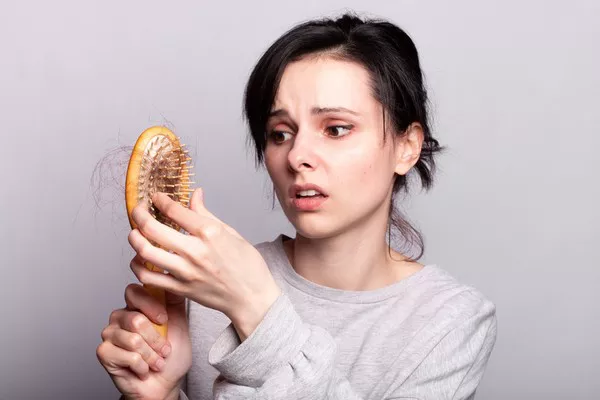Hair loss can be a distressing experience for both men and women. While genetics, hormonal imbalances, and age are often associated with this condition, one often overlooked factor is nutrient deficiency. A lack of certain essential nutrients can significantly impact the health and growth of our hair follicles. In this article, we will explore the role of specific nutrients in maintaining vibrant and luscious locks. By identifying the nutrient deficiencies that contribute to hair loss, we can take proactive steps to ensure our diets are balanced and optimized for healthy hair growth.
I. Iron Deficiency: Unlocking the Hidden Connection
Iron: The Mighty Key to Hair Health
Iron plays a vital role in our bodies, including the growth of healthy hair. Insufficient iron levels can lead to anemia, a condition that reduces the supply of oxygen to hair follicles. This lack of oxygen hampers the hair’s growth cycle, resulting in hair loss. If you notice excessive shedding, pale skin, or fatigue, you might be lacking iron.
II. The Bountiful Power of B Vitamins
B Vitamins: Fueling Hair Growth B
vitamins, such as biotin (B7), niacin (B3), and cobalamin (B12), are essential for healthy hair growth. Biotin, in particular, plays a crucial role in the production of keratin, a protein that forms the structure of hair. A deficiency in these B vitamins can lead to weakened hair strands, hair breakage, and hair loss. Incorporating foods like eggs, nuts, whole grains, and leafy greens can help replenish these vital nutrients.
III. Vitamin D Deficiency: The Sunshine Vitamin and Hair Health
Vitamin D: Illuminating Hair Follicles
Vitamin D, often referred to as the “sunshine vitamin,” is not only crucial for bone health but also for maintaining healthy hair follicles. Research suggests that vitamin D deficiency may be linked to hair loss, as it plays a role in the hair growth cycle. Ensuring adequate exposure to sunlight and consuming vitamin D-rich foods like fatty fish, fortified dairy products, and mushrooms can help support healthy hair growth.
IV. Zinc: The Unsung Hero of Hair Follicles
Zinc: Strengthening the Hair Foundation
Zinc is an essential mineral that supports various bodily functions, including the growth and repair of hair tissue. It aids in the production of sebum, the natural oil that keeps the scalp moisturized and nourished. A deficiency in zinc can weaken hair follicles, leading to brittle, thinning hair and increased hair shedding. Incorporating zinc-rich foods such as oysters, beef, pumpkin seeds, and legumes into our diet can help prevent hair loss caused by zinc deficiency.
V. Protein: The Building Blocks of Beautiful Hair
Protein: Nurturing Hair from Within
Hair is primarily composed of a protein called keratin, making dietary protein a crucial component of hair health. Insufficient protein intake can lead to weakened hair strands, slow hair growth, and increased hair shedding. Ensuring an adequate protein intake by consuming lean meats, poultry, fish, beans, and lentils can help maintain healthy hair growth.
Conclusion :
Understanding the role of nutrient deficiencies in hair loss can empower us to make informed decisions about our diet and overall health. Iron deficiency, B vitamin deficiencies, insufficient vitamin D, inadequate zinc levels, and low protein intake are all potential culprits contributing to hair loss. By addressing these deficiencies through dietary changes or supplements, we can support the health and vitality of our hair. It is important to remember that hair growth is a complex process influenced by multiple factors, and addressing nutrient deficiencies is just one piece of the puzzle. Consulting with a healthcare professional or a registered dietitian can provide personalized guidance based on your specific needs.
In addition to addressing nutrient deficiencies, it is essential to adopt a holistic approach to hair care. This includes gentle handling of the hair, avoiding excessive heat styling, and using products suitable for your hair type. Regular scalp massages can also stimulate blood circulation and promote hair growth.
While nutrient deficiencies can contribute to hair loss, it is crucial to rule out other underlying medical conditions or hormonal imbalances that may be causing or exacerbating the problem. If you experience persistent or severe hair loss, it is advisable to seek medical advice for a proper diagnosis and treatment plan.
Remember, achieving and maintaining healthy hair requires a comprehensive approach that encompasses both internal and external care. By nourishing our bodies with the right nutrients, practicing good hair care habits, and addressing any underlying health issues, we can promote hair growth, reduce hair loss, and enjoy a fuller, more vibrant mane.
So, next time you find yourself searching for the root cause of your hair loss, don’t overlook the impact of nutrient deficiencies. Iron, B vitamins, vitamin D, zinc, and protein are all essential components for maintaining healthy hair follicles. Incorporate a variety of nutrient-rich foods into your diet, consider targeted supplements if necessary, and consult with professionals to ensure you’re on the right track. With a balanced approach, you can unlock the potential for beautiful, resilient hair that shines with vitality.

